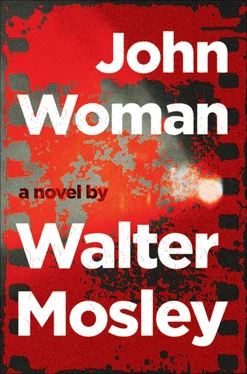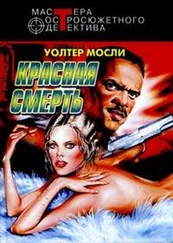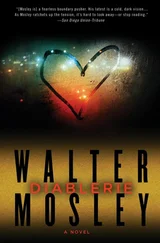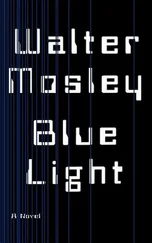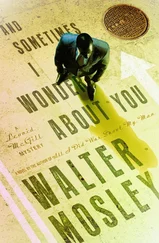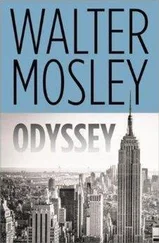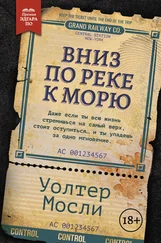One night, when John had walked until his feet ached, a young man came up to him. The stranger had swarthy skin and straight black hair.
He punched John in the chest and then grabbed him by the cloth shoulder of his windbreaker.
“Give me your money or I’ll kill you,” he said.
Not thinking John unsheathed the belt-buckle knife and slashed the mugger three times: on the wrist, across the chest and then down the center of his face.
The man screamed and blood spurted from the cut that ran from his forehead past the nose to the chin. Something clattered to the sidewalk and the man ran off screaming, calling out for help.
It was after three a.m. and there was no one out on Greene. John watched the mugger run a zigzag path dripping blood, trying to run away from his wounds. On the ground was a sleek blue-black pistol next to a few spatters of fresh blood. John picked it up and walked away.
“Three times,” he said to himself. “I cut him three times just like I hit Lorraine.” There was no objective insight in this equation. Three blows and someone either lived or died. John was not culpable. He was the crime but not necessarily a criminal.
The next day John no longer felt like looking for the prostitute or reading to his dead father. He washed the mugger’s blood from his hands and clothes, cleaned the belt-buckle knife and examined the pistol he’d won.
It was a .22 caliber revolver with bullets in four of the chambers. John didn’t know guns but he looked this one up on his cell phone browser. After unloading it, he made sure that he understood the safety and the resistance of the trigger.
He sat in the window looking down on Mott and feeling nothing in particular.
The phone rang only once on its little table before John answered.
“Hello?”
“Johnny?”
“Who is this?”
“It’s Senta, baby. How are you?”
“Uhm, uh, fine. How did you get this number?”
“Nesta works for the phone company. I was so sad about you being in trouble that she set up her computer to get news alerts on you, both names. Then when we found out that you were free she used her access to get your mother’s number. You remember... you told me your mom’s name.”
“And this phone is still listed under that?” John said. “Of course — in case she ever wanted to go back to her old life.”
“Huh?”
“How are you, Senta? How’s Nesta?”
“She’s a wonder. Every day I thank God we’re together again. I don’t work for Lou anymore. That was just too weird. Taking classes for my real estate license. But I’m calling because I wanted to know if you needed anything.”
“This call is the best thing you could give me.”
“That’s sweet,” Senta said. “I’d come out there and tie you down but Nesta and me are working on the house. You could come stay with us for a while if you wanted. We have a room for visitors.”
“Um... that’s really nice, Senta. Actually it’s a wonderful offer but I should probably stay put for the time being. How’s the house coming along?”
John sat back, closed his eyes and for the next hour listened while Senta told him about her dream house. Every ten minutes or so she’d say, “But what about you, baby?” He’d tell her that it was too soon to talk about it.
When John hung up the doorbell sounded. For a moment he felt that these two events must have been connected.
“Who’s there?” John asked through the door.
“Morton Brown,” a man said.
“What do you want, Mr. Brown?”
“May I come in, Professor Woman?”
“Maybe after you answer my question; maybe not.”
“I’m dean of the social sciences department at Medgar Evers College in Brooklyn.”
“City College?”
“It’s in that system.”
“What do you want with me?”
“To offer you a job.”
“... Felton Lewis teaches journalism at Medgar.” Morton Brown and John faced each other in the chairs at the bay window.
“He said that he’d talked to you,” the dean continued, “and studied online recordings and videos of your lectures at NUSW. He’s very impressed with your process, taking on the function of the study of history as well as the meaning of historical forces in everyday life.”
“I don’t know anyone named Felton.”
“He calls himself Sharkey when he’s working.”
“Oh.”
Morton was a tall, fleshy man with gray-brown skin and murky gray eyes. His hair comprised the colors dark copper, dull gold and lusterless gray. John wondered how many races it took to create the academician’s features.
“And what kind of job did you have in mind?”
“A visiting lecturer.”
“A temporary resident deconstructionist historian?”
“Exactly.” Morton Brown smiled revealing a space between his front teeth. “We’ve already asked the best students in the department. They are very excited.”
“I faked my records in the City College system in order to get into Yale,” John said. “I can’t imagine that I’d be welcomed with open arms.”
“We’ll be hiring you as a guest. The central bureaucracy has nothing to say about that.”
“But why would you want me, an accused murderer, in the classroom?”
“We believe that you will be a valuable addition to our curriculum,” Morton said with emphasis.
“But you don’t know me.”
“I know Professor Lewis and I’ve also seen your lectures. I was especially intrigued by the Trash Can Talk.”
John thought about the man he had slashed a few hours before. He was bleeding heavily; maybe he’d died. It was clearly self-defense even though John was unaware of the pistol in his attacker’s hand. Because of this ignorance he was morally culpable if not legally so.
And now there was a man offering him a job...
“Is there a community newspaper that serves the neighborhoods around your school, Professor Brown?”
“Yes. The Clarion. ”
“You know I confessed to the crime of manslaughter?”
“Of course I do,” Morton allowed. “You’re a kind of hero among us.”
“Us?”
“Black college teachers, men and women, who want to, want to actualize the education we’re giving our students. I bet even white professors like you. I mean how many teachers since Socrates actually lived what they taught?”
“Socrates wasn’t a murderer.”
“Neither are you.”
“I would have thought I’d become a pariah at places like Medgar Evers.”
“No, sir. For many of us you are a herald.”
John thought again about the man he’d slashed, about the violence seething in himself. Maybe he needed the protection of a university. There the world might be safe from him.
“I will agree to teach a course I had been thinking about before my troubles out west,” he said. “The name of the class is The School of Suspicion.”
“What is it about?” Brown asked.
“The subject is suspect.”
“Is it how one interrogates their world?”
“More how they fail to understand the world — even as they create it.”
“And what does that have to do with the local paper?”
“I will admit thirty students to the class,” John said. “Fifteen can come from the student body but the other fifty percent needs to be people from the community who will have to apply directly to me.”
“What will be your criteria for acceptance?”
“I won’t know until I’ve read what they have to say.”
“You’ve been thinking about this for some time,” Professor Brown concluded.
“Not at all. I do have a question though.”
“What’s that?”
“Are you acquainted with an organization called the Platinum Path?”
Читать дальше
